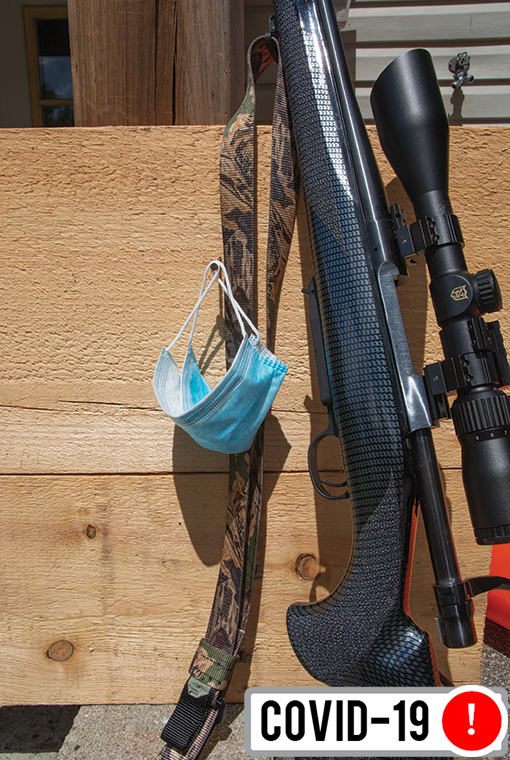Hunting during a pandemic

Now more than ever, Ontario hunters are looking forward to the fall seasons. Hunting provides a major boost to mental and physical health, plays an important role in wildlife management, and helps the provincial economy. By planning ahead and making some changes, hunters can keep doing what they love while contributing to the fight against COVID-19. Here’s what you should know.
Should you go hunting?
The government is asking people to stay home as much as possible, so every hunter needs to take a hard look at their situation and determine if they can hunt within the public health guidelines.
The government recommends that anyone who is in an at-risk group, who thinks they have COVID-19 symptoms, or who might have been exposed to someone with COVID-19 should self-isolate. Hunting can wait until you are not putting yourself or the public at risk.
Things to consider before you go
Licences/permits/tags: Many hunters rely on Service Ontario, licence issuers, and Canada Post offices (migratory game bird hunting permits) to get their licences and tags. Make sure those locations are open by calling ahead. If none are available in your area, you can set up an online account or ask a trusted individual to help you do so (www.huntandfishontario.com or www.permis-permits.ec.gc.ca/en/PurchaseHuntingPermit) and then print your licences, tags, permits, and stamps at home.
Firearms: If you are gun hunting this fall, you are required to carry your Possession and Acquisition Licence (PAL). COVID-19 has led to lengthy delays in licence renewals, so if your PAL expires later this year, renew it as soon as possible (the online option is the quickest).
There is a six-month grace period for expired PALs, but there are strict restrictions during that time. The grace period only allows you to legally store, but not use, your firearms until your PAL is renewed.
Equipment: Take inventory of your equipment in case you need to buy or replace something. COVID-19 has led to shortages of some items so don’t count on being able to pick up that box of ammo or spare archery release on your way hunting.
Processing game meat: If you plan on using a butcher, call before the season to ensure they are still operating and accepting wild game.
Accessibility: Make sure the area you are planning to hunt is still accessible. Visit www.ofah.org/covid19closures for up-to-date information. If planning to hunt on public land, have a backup location in case crowding makes physical distancing not feasible where you planned to go.
Are you travelling?
Many hunters travel to get to their hunting locations. Before leaving on your trip, make sure that you follow any travel advisories. Physical distancing will make carpooling a challenge, especially with people outside your social circle. You may need to take more vehicles than usual, which may increase costs.
Prior to OOD’s publication deadline for this issue, Canada’s international border remained closed to non-essential travel, including hunting. Whether you’re planning on visiting Canada to hunt this fall or hosting non-resident hunters, make sure you are aware of any restrictions.
Camp life
Some of the biggest challenges this fall will likely be felt by hunt camps. Camp life is communal, with tight sleeping quarters, buffet-style meals, and friendly (or not so friendly) card games, which may not be possible if physical distancing is still in place.
While it won’t solve all the problems and it won’t work for everyone, temporarily expanding sleeping space could allow more people to stay at the camp and hunt together in the field. For some hunters this could be as simple as bringing an extra tent but another option to consider would be renting a recreational vehicle. In some cases, rental delivery to the site may be an option, making logistics much easier.
In the field
Most hunting is physically distant, but there are a few spots that will require added care such as in blinds, treestands, watercraft, and vehicles like side-by-sides. Care should also be taken when sharing blinds and stands between hunts, especially if they are enclosed.
Physical distancing may not be feasible when a big animal is on the ground. Especially for moose, hunters have to work as a team to get the animal quartered and out of the bush. When working closely together can’t be avoided, wearing a mask is a good idea.
What about refunds?
One of the most common questions for hunters involves refunds. The Ministry of Natural Resources and Forestry has stated they they are considering an option for reimbursement or credits for purchased big game licences if seasons are cancelled due to COVID-19 restrictions. If hunting is still permitted, but restrictions or personal situations prevent you from hunting, it appears unlikely that the MNRF will offer refunds.
What we don’t know yet
At the time of print publication, the government had not provided any information about how people might move between social circles. Hopefully by the fall, more information will be available, as being in a social circle with your hunting partners would make things much easier.
Dr. Keith Munro is a wildlife biologist with the Ontario Federation of Anglers and Hunters (OFAH).
